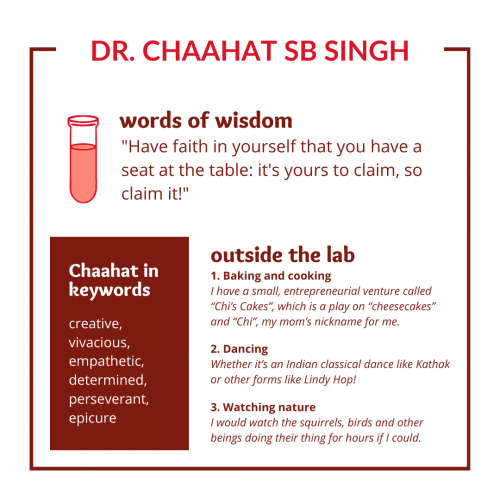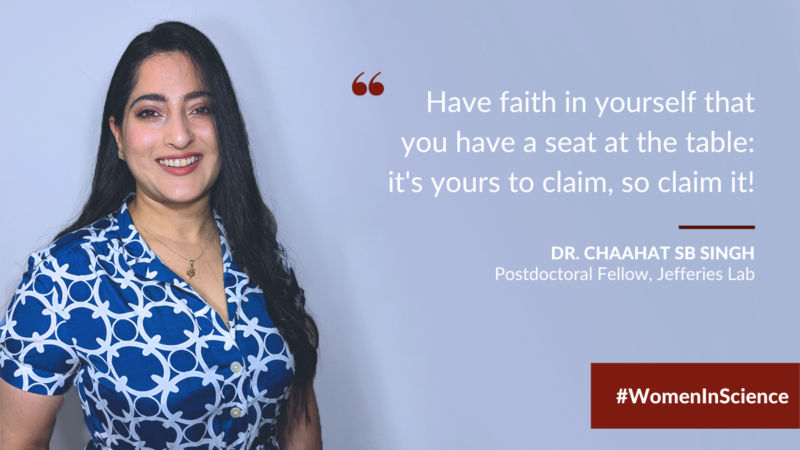Newsroom
#WomenInScience: Dr. Chaahat SB Singh is unraveling the mysteries of the central nervous system
Driven by a love for discovery, Dr. Chaahat SB Singh’s research explores treatments for central nervous disorders, like Alzheimer’s disease and major depressive disorder.
For the International Day of Women and Girls in Science, The Centre for Blood Research had the pleasure of speaking with women scientists at different points in their career journey, including Dr. Chaahat Singh, a Postdoctoral Fellow in the Jefferies Lab.
Tell me about your research. What led you to science?
I’ve always been a science nerd, whether I like to admit it or not! My journey started in microbiology, but for the last 8 years at UBC, I’ve been working on different central nervous disorders. This includes Alzheimer’s disease and major depressive disorder.
During my PhD, I focused on understanding cerebrovascular dysfunction, and the role it plays in the pathology of Alzheimer’s disease. My grandfather had Alzheimer’s, so that got me really passionate about this topic. In our animal studies, we repurposed antiangiogenic cancer therapeutics – cancer chemotherapy drugs – to treat Alzheimer’s disease, and found that this reversed AD pathology in mice, by dramatically reducing abnormal blood vessel growth and restoring the blood brain barrier.
 Most importantly, the treatment actually restored memory, which, if it works in humans, would be huge for improving the quality of life for people living with Alzheimer’s. Since these drugs are already FDA-approved for other uses, the translation from clinical studies to everyday use would be much faster compared to developing an entirely new drug.
Most importantly, the treatment actually restored memory, which, if it works in humans, would be huge for improving the quality of life for people living with Alzheimer’s. Since these drugs are already FDA-approved for other uses, the translation from clinical studies to everyday use would be much faster compared to developing an entirely new drug.
As a postdoc I’m looking at how certain psychedelic drugs, like psilocybin and its analogues, can treat major depressive disorder. Inflammation actually plays a role in both Alzheimer’s disease and major depressive disorder, so while these conditions may be different, I see myself as just shifting track a little to find commonalities between them.
That’s the fun thing about science. You’re always discovering something new, and your experiments might trigger a chain reaction to someone else’s discovery or research question.
- Read more about Dr. Singh’s work on Alzheimer’s disease: Cancer chemotherapy drug reverses Alzheimer’s symptoms in mice
Is the discovery aspect of science what drives you?
Totally! Problem-solving has always excited me, and I love a good challenge.
It’s also very gratifying when discovery leads to scientific applications that benefit society. I really appreciate people who do basic science, but what excites me the most is science with a translational aspect, where you can discover a new target for a disease and take your work forward to clinical studies.
We put in years and years of our lives into science. It’s a very gradual process that involves a whole team, and the people before you and after you. But even if your work is a drop in the ocean, if it can bring just one iota of change in the world, you will have succeeded.
Even if your work is a drop in the ocean, if it can bring just one iota of change in the world, you will have succeeded.
 What has been your biggest challenge as a scientist?
What has been your biggest challenge as a scientist?
As scientists, we crave answers, and there are times when one feels discouraged when the results have not met one’s expectations. Eventually, I’ve been able to overcome that by digging deep within and reminding myself of my motivation and ultimate goal for doing science in the first place – that is, to seek new knowledge!
I’m sure that many other scientists struggle with this too. For those who do, I would say: “Don’t be scared; it’s discovery.” Things may not work out the way you planned, and that’s OK, because that’s the whole point of testing a hypothesis. You have to try and remain unbiased, which is hard because we get very attached to our research, but remember that science is a discovery process. At the end of the day, you’re just trying to find the truth, whatever that truth is. No discovery is a bad discovery!
There will be times when you feel like quitting, but every day is a new start to ask yourself, “Okay, how do I solve this?” As human beings, we have a lot in us to persevere, even when we don’t know our own strength.
Do you have any advice for young girls interested in STEM?
Always remember where your curiosity comes from. What excites you? If discovery is what pushes you out of bed in the morning, remember that feeling, even when you feel down.
Related to this, I’d like to share the words of Mae Jemison, the first Black woman astronaut:
Don’t let anyone rob you of your imagination, your creativity, or your curiosity. It’s your place in the world; it’s your life. Go on and do all you can with it, and make it the life you want to live.
As women, I think we have all faced challenges. It could be people doubting us, judging our ‘presentability’, thinking we are too vivacious, or telling us to mind our Ps and Qs. That can get you down, especially when you are young and impressionable.
In the past and as an international woman student, some have doubted my abilities, but as time went by, I successfully finished my PhD and have gotten very good research under my belt. Don’t pay heed to the naysayers. Over time, your work will speak for itself; your publications and research will serve as evidence for what you can accomplish. The evidence will be there, and evidence is what you need in science, right?
Have faith in yourself that you have a seat at the table: it’s yours to claim, so claim it!
What is your parting message for anyone reading this?
Science is an adventure and ever-changing. It’s not to be feared, but only understood.
Thanks to Dr. Singh for sharing her story with us! February 11 is recognized by the United Nations as the International Day of Women and Girls in Science, which highlights the contributions of women in STEM and aims for full and equal access to participation in science, technology, and innovation for women and girls.
Originally posted by the Centre for Blood Research.